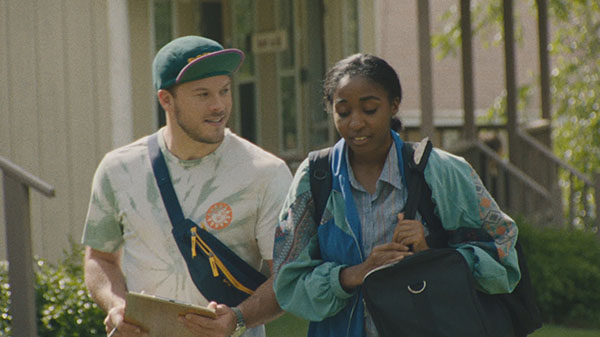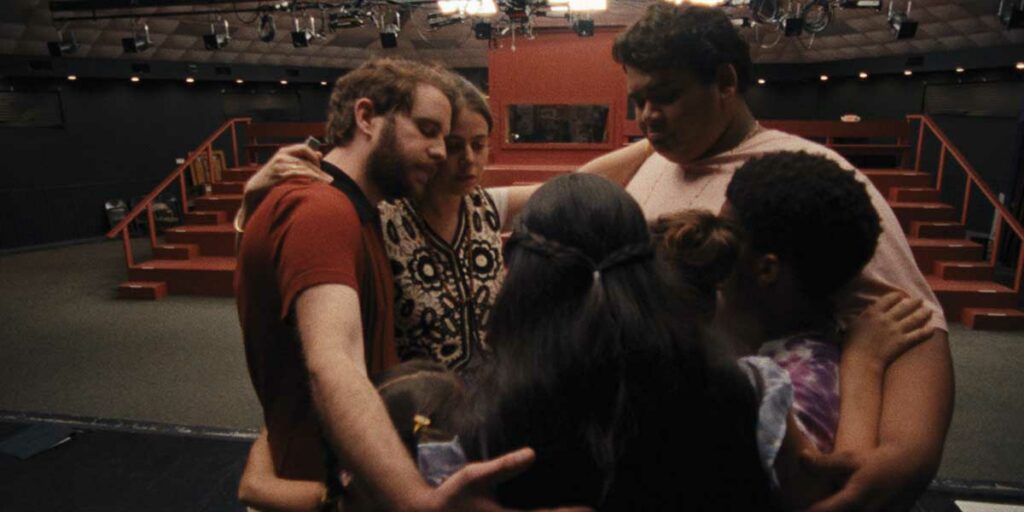Theater Camp is a delightful romp that delivers laughs and pokes fun with self-awareness, letting a genuine love for theater and community shine through.
Author: Alex Ackerman
Hilarious and heartfelt, Theater Camp is a love letter to the art of theater that pulls no punches with its depiction of the inanity of the people behind it. The mockumentary celebrates the absurd and the eccentric, and rarely misses a beat in evoking laughs, with the cast giving stellar performances in tandem with a cleverly written script. The genius of Theater Camp lies in its combination of comedy and sincerity, which shines through and illuminates the power of art and community.
Following the teachers and students over the course of the camp’s duration, the film immediately establishes a comedic and chaotic tone, as calamity strikes within the first five minutes. The inciting incident itself shows that even the biggest promoters of the theater can fall victim to it, as Joan Rubinsky (Amy Sedaris), the founder of the summer theater camp AdirondACTS, suffers a seizure and falls into a coma due to strobe lights during a student production of Bye Bye Birdie. Her son, Troy (Jimmy Tatro), has big shoes to fill as he takes over the responsibility of keeping the camp open, with even higher stakes than he anticipated. Without the proclivity for theater that his mother held, Troy–the “enTROYpreneur”–must learn to adapt to this strange new world into which he is thrust.
Multiple plot points weave their way through the film, as camp teachers and best friends Rebecca-Diane (Molly Gordon) and Amos Klobuchar (Ben Platt) navigate their changing friendship while writing and directing the student musical Joan Still, a creative interpretation of the life of their beloved, hospitalized director. Along the way, viewers follow the experiences of the numerous camp attendees, who treat their responsibilities with the same gravitas as if they were on Broadway itself.
Theater Camp is evidence of the fact that some of the best actors viewers see on the screen are theater kids at heart, and who better to poke fun at theater kids than theater kids themselves?
Using the framing device of the mockumentary, directors Molly Gordon and Nick Lieberman offer an honest depiction of both the hilarity and hard work that it takes to pull off a production. The fast pace of the film matches the sharp and witty humor that is exchanged beat after beat. At the same time, the emotional moments are given the necessary time to bloom, with the performances heightening the overall effectiveness and the impact left on the viewer.

In addition to Molly Gordon, Ben Platt, and Jimmy Tatro, Noah Galvin as stagehand Glenn Winthrop leaves a lasting impression and cements the emotional core of the film. Ayo Edebiri, although underutilized, also clicks with the tone of the film and rest of the cast, with her dry delivery standing in effective contrast to the over-exaggerated and sentimental mannerisms of Rebecca-Diane and Amos. The cinematography, mis-en-scène, and editing imbue the film with a sense of authenticity; the viewer empathizes with the wide range of characters, even when they make mistakes, and with the camp itself, which has noticeably fewer resources than their more affluent competitor, Lakeside. The form of the film as a mockumentary and comedy informs and reinforces the themes with which it grapples.
At the core of the film resides the importance of community, especially for those who are considered different or outcasts. For teachers and students alike, the camp serves as a place of belonging, where theatrical talent is celebrated and pushed to develop further. Even if the rest of the world casts doubt or judgment, at camp, they are all a part of something special. The filmmakers complicate and expand upon this theme of community with the introduction of “crypto-bro” Troy, who never connected with theater and is out of his element in every possible way, on top of the financial stress of preventing the camp’s foreclosure. In this way, the film adds further nuance about what it means to challenge one’s preconceived notions and embrace those with whom one may think they have little in common.
Within the niche of this messy and loving family, Theater Camp also grapples with friendship and all its complexities, raising questions of sacrifice and what it means to follow your own path while staying true to your friends. Here, Gordon and Platt especially shine, as they convincingly depict the emotional rollercoaster of teaching their students, pursuing their own passions, and rediscovering what they want their friendship to mean. The interpersonal dynamics between characters comprise the heart of the film, which underpins the emphasis on community and kinship.
Theater Camp also explores the question of compromising art and talent for the sake of money, and it makes its position apparent from the get-go. No amount of money or iPads can replace the genuine passion and talent that can bring a group of people together in the pursuit of creating something meaningful. Thus, the filmmakers shine the spotlight on the importance of the theater as a means of both personal expression and collaboration, weaving the idea of community into the concurrent theme of art as beautiful, necessary, and human.
Theater Camp is a delightful film that rarely misses in both its comedic and emotional beats. The combination of cast performance, writing, and editing create an effective mockumentary with a genuine love for theater at its core. A perfect summer movie, Theater Camp offers lighthearted laughs and champions the eccentric, the dramatic, the comical, the human.
Theater Camp is out now in US theaters. Read Alex Ackerman’s review of The Battle of Chile below!

